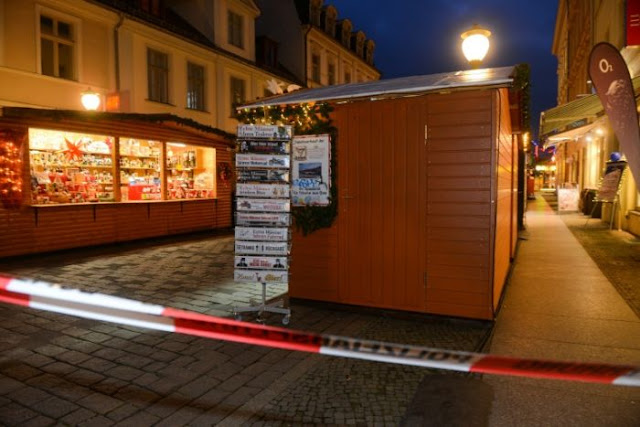 |
| Suspicions of an unconventional explosive device have been confirmed |
German police evacuated the Christmas market in Potsdam, near Berlin, following an alert over a suspicious package that is believed to be explosive, reported AFP on Friday.
"Suspicions of an unconventional explosive device have been confirmed," police in Brandenburg state outside Berlin said on Twitter
.
Special forces were on site to examine the package which was described as a package measuring 40cm by 50cm, delivered to a pharmacy near the market reported the Potsdamer Neueste Nachrichten newspaper.
Police said a pharmacist had sounded the alert after finding a can with wires inside the package.
The device was found in a package found at a pharmacy just off the Christmas market in central Potsdam
Germany has been on high alert for possible jihadist attacks after last December's deadly attack at a Berlin Christmas market.
The attacker, Tunisian asylum seeker Anis Amri, hijacked a truck and murdered its Polish driver before killing another 11 people and wounding dozens more by ploughing the heavy vehicle through the festive market in the centre of the city.
He was shot dead by Italian police in Milan four days later while on the run.
Germany has since been targeted again in attacks with radical Islamist motives.
In July 2017, a 26-year-old Palestinian asylum seeker wielding a knife stormed into a supermarket in the northern port city of Hamburg, killing one person and wounding six others before being detained by passers-by.
German prosecutors said the man likely had a "radical Islamist" motive.
And at the end of October, German police arrested a 19-year-old Syrian identified only as Yamen A. suspected of planning a "serious bomb attack" using powerful explosives.
The IS also claimed responsibility for a number of attacks in 2016, including the murder of a teenager in Hamburg, a suicide bombing in the southern city of Ansbach that wounded 15, and an axe attack on a train in Bavaria that left five injured.
Germany remains a target for jihadist groups, in particular, because of its involvement in the coalition fighting IS in Iraq and Syria, and its deployment in Afghanistan since 2001.
German troops in the anti-IS coalition do not participate in combat operations but support it through reconnaissance, refueling, and training.
Germany's security services estimate there are around 10,000 Islamic radicals in Germany, some 1,600 of whom are suspected of being capable of using violence.
Chancellor Angela Merkel has allowed in more than one million asylum seekers in the past two years -- a decision that has driven the rise of the far-right Alternative for Germany (AfD) party, which charges that the influx spells a heightened security risk.
Source: i24news

No comments:
Post a Comment